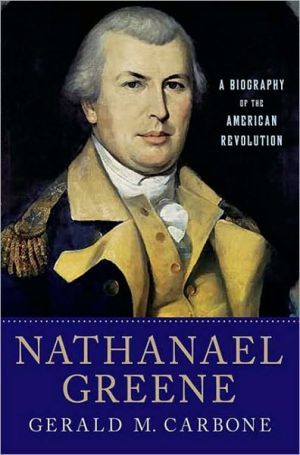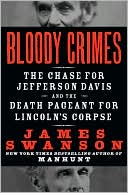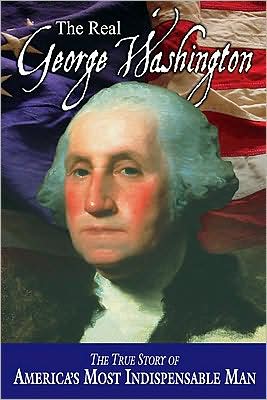Nathanael Greene: A Biography of the American Revolution
"When the Revolutionary War began, Nathanael Greene was a private in the militia - the lowest rank possible - yet he emerged from the war with a reputation as one of George Washington's most gifted and dependable officers. Upon taking command of America's Southern Army in 1780, Nathanael Greene was assigned 1,500 starving, nearly naked troops. Gerald M. Carbone explains how, within a year, Greene transformed his army into a fighting force that ran the much more numerous, and better equipped,...
Search in google:
When the Revolutionary War began, Nathanael Greene was a private in the militia, the lowest rank possible, yet he emerged from the war with a reputation as George Washington's most gifted and dependable officer—celebrated as one of three most important generals. Upon taking command of America's Southern Army in 1780, Nathanael Greene was handed troops that consisted of 1,500 starving, nearly naked men. Gerald Carbone explains how within a year, the small worn-out army ran the British troops out of Georgia, South Carolina, and North Carolina and into the final trap at Yorktown. Despite his huge military successes and tactical genius Greene's story has a dark side. Gerald Carbone drew on 25 years of reporting and researching experience to create his chronicle of Greene's unlikely rise to success and his fall into debt and anonymity. Publishers Weekly Although Nathanael Greene's military accomplishments generally receive less attention than Benedict Arnold's or Lafayette's, historians consider him the better general. Journalist Carbone's lively chronicle corrects this neglect. A young Rhode Island businessman, Greene (1742-1786) was only a private in his state militia, but his political influence vaulted him to its command when fighting broke out in 1775. Washington saw Greene's impressive astuteness, and Greene became the Continental Army's youngest general. His greatest feats came after 1780, when Washington sent him to the south, an area that had ruined three previous generals. Leading poorly equipped troops and vastly outnumbered by Cornwallis's forces, he fought off the British; frustrated, Cornwallis marched north to Yorktown and defeat. Bad investments and his guarantee of loans to obtain military supplies left Greene owing huge sums, and he spent the last two years of his life struggling with creditors. Inevitably the book focuses on the war, wartime politics, the Americans' inability to support the army financially and Greene's military success. He should be better known, and this well-researched history aimed at a popular audience is a good first step. (July)Copyright © Reed Business Information, a division of Reed Elsevier Inc. All rights reserved.
List of IllustrationsBk. I The North1 War, War Boys! 32 Mad, Vext, Sick and Sorry 213 Their Eternal Honor 494 Sore with the Hardships 835 Treason of the Blackest Dye 123Bk. II The Southern Campaigns6 The Cowpens 1497 Rise, and Fight Again 1698 Eutaw Springs 1919 Mulberry Grove 221Notes 237Bibliography 257Index 261
\ Publishers WeeklyAlthough Nathanael Greene's military accomplishments generally receive less attention than Benedict Arnold's or Lafayette's, historians consider him the better general. Journalist Carbone's lively chronicle corrects this neglect. A young Rhode Island businessman, Greene (1742-1786) was only a private in his state militia, but his political influence vaulted him to its command when fighting broke out in 1775. Washington saw Greene's impressive astuteness, and Greene became the Continental Army's youngest general. His greatest feats came after 1780, when Washington sent him to the south, an area that had ruined three previous generals. Leading poorly equipped troops and vastly outnumbered by Cornwallis's forces, he fought off the British; frustrated, Cornwallis marched north to Yorktown and defeat. Bad investments and his guarantee of loans to obtain military supplies left Greene owing huge sums, and he spent the last two years of his life struggling with creditors. Inevitably the book focuses on the war, wartime politics, the Americans' inability to support the army financially and Greene's military success. He should be better known, and this well-researched history aimed at a popular audience is a good first step. (July)\ Copyright © Reed Business Information, a division of Reed Elsevier Inc. All rights reserved.\ \ \ \ \ Kirkus ReviewsRhode Island journalist Carbone gives a little-known Revolutionary War leader his due in this admiring biography. Frequently dubbed Washington's best general, Nathanael Greene (1742-86) played an active role in the Rhode Island militia during the turbulent years before the revolution. The son of a wealthy businessman, he disliked British taxes as much as the average American merchant. At the outbreak of hostilities in 1775, the state's General Assembly appointed him commander of Rhode Island's army. Most of Greene's military knowledge came from books, but he was a quick learner and a natural leader. Observers at the 1775 siege of Boston noted that the Rhode Island camp stood out for its order and hygiene, as well as the professional deportment of its men. Although historians debate Washington's military talents, they agree he was a shrewd judge of men; when he arrived to command the colonial forces he quickly approved of Greene, who at 32 became the rebel colonies' youngest general and Washington's right-hand man. He participated in most campaigns and was appointed to the Southern Command in 1780. Despite leading a few thousand ragged, unpaid, often unfed troops far less numerous than the enemy, Greene conducted a brilliant campaign, reversing a string of defeats to frustrate Cornwallis's offensive and lead him to disaster at Yorktown. Receiving little support from the Continental Congress or the states, he pledged his personal fortune to obtain supplies and ended the war with massive debts that burdened him for the three years that remained in his short life. Drawing on Greene's papers and the usual 18th-century sources, Carbone writes a straightforward biography while touching thetraditional historical bases. A lucid account of the Revolutionary War from the point of view of its most successful general.\ \ \ From the Publisher"The personality of George Washington has so dominated the story of the American revolution that many of his able lieutenants have been relegated to history’s sidelines. One of these, Nathanael Greene, is now the subject of…a engaging new biography by Rhode Island journalist Gerald M. Carbone…[who] has made extensive use of the Greene papers, and these afford a rounded portrait of his subject." – The Washington Times\ "Carbone gives a little-known Revolutionary War leader his due in this admiring biography... [A] lucid account of the Revolutionary War from the point of view of its most successful general." — Kirkus\ “A brisk march through Greene’s short life (44 years) but action-packed military career…Arranging events in a chronological illustration of Greene’s canniness in the duel of Cornwallis, Carbone’s informative portrait should connect with the American Revolution readership.” — Booklist\ "Although Nathanael Greene's miliary accomplishments generally receive less attention than Benedict Arnold's or Lafayette's, historians consider him the better general. Journalist Carbone's lively chronicle corrects this neglect...He should be known better, and this well-researched chronicle...is a good first step." — Publisher's Weekly\ "To this much-needed new biography of America's most unjustly neglected Revolutionary War hero, Gerald Carbone brings a journalist's concision, a storyteller's eye for illuminating detail, a wry New England sensibility, and a historian's diligence. The result is a compelling account of how Nathanael Greene, the self-taught former Quaker ironmaster from Rhode Island, made himself over into the Continental Army's finest strategist and one of the best minds of Enlightenment America. Carbone carries us deftly through the triumphs and tragedies of this remarkable life, offering us a Founder of flesh, blood, acumen and ambition who, had he lived longer and his luck been kinder, might even have become president." —Charles F. Price, award-winning author of Freedom's Altar and of Nor the Battle to the Strong\ "Ged Carbone has written a lively, accessible biography of one of the truly great strategists in American history, Major General Nathanael Greene, second only to Washington in the pantheon of heroes of the War of the Revolution." —John Buchanan, author of The Road to Guilford Courthouse\ "Nathanael Greene remains one of the American Revolution's most compelling yet unsung heroes. In Nathanael Greene Gerald Carbone provides a complex and absorbing portrait of a resourceful general, a devoted husband, an unfortunate businessman and an ardent American patriot. Carbone cleary admires his subject but also portrays his all-too-human human sides. Well-researched, the general's story is told against a backdrop of dramatic battle scenes, wonderful characters and revolution that seems on the verge of collapse if not for the extraordinary sacrifices of figures such as Greene, to whom all Americans will be forever indebted."—Mark Puls, award-winning author of Samuel Adams and of Henry Knox\ “With a journalist’s eye for telling anecdote and pithy, but illuminating, quotation, Ged Carbone makes Nathanael Greene come alive in this lively, readable biography that is also very good history.” —Dennis Conrad, Editor, Papers of General Nathanael Greene\ \ \








